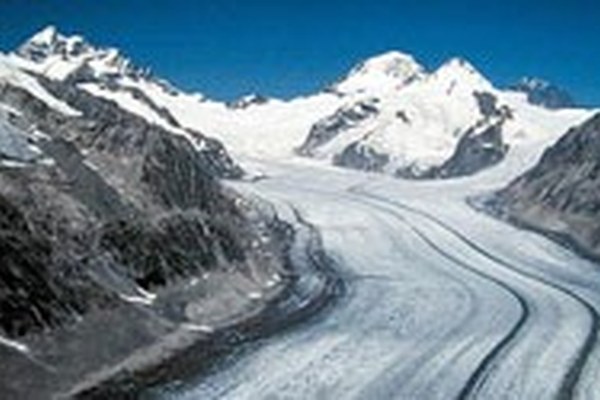Articles
ClimChAlp Project completed
The final conference in Laufen/D on 12 March 2008 marked the end of the Interreg IIIB Alpine Space Project "ClimChAlp" (Climate Change, Impacts and Adaptation Strategies in the Alpine Space).
Laser scanner to protect against floods
As part of the EU-sponsored research project FloodScan the German Land of Bavaria is to be photographed and surveyed from the air using laser scanners.
An outgoing airport for the Allgäu
In the view of the project's initiators the opening of the Memmingerberg regional airport in the Allgäu/D on 28 June represents the "opportunity of the century". Bavaria subsidised the project to the tune of €7.3 m, with total investments amounting to €20 m.
German environmental associations obtain greater rights of action
With the coming into force on 15 December 2006 of Germany's environmental legal remedy legislation environmental associations have been given greater rights of action in the area of environmental protection.
Cross-border network of Caucasian mountain villages
Mountain communities in the Caucasus have adopted a memorandum aimed at establishing a cross-border community network modelled on the "Alliance in the Alps".
New CIPRA resolution for climate protection
CIPRA, the International Commission for the Protection of the Alps, adopted a resolution on "Climate Protection and Climate Change Adaptation Strategies" at its Assembly of Delegates in Bad Hindelang/D on 18th May.
International Master of Landscape Architecture
(12.01.2006) The Master of Landscape Architecture (IMLA) at the University of Applied Sciences Rapperswil/CH is to be expanded in 2006, and will now also be available jointly at the Universities of Nürtingen-Geislingen/D and Weihenstephan/D.

CIPRA Yearly Symposium 2006: tourism and regional planning in weather stress
(01.12.2005) The 2006 Yearly Symposium of the International Commission for the Protection of the Alps (CIPRA) is to be held in Bad Hindelang/D from 18 to 20 May. The Symposium is to focus on the growing threat to alpine regions posed by natural hazards and the impact of the climate change on alpine tourism.
Climate protection measures for a hot Bavaria
Representatives of Bavaria's Ministries of the Environment, Economic Affairs, Agriculture and the Interior, and of the Bund Naturschutz have agreed on around a dozen climate protection measures in a further step in implementing the Climate Protection Alliance they concluded in 2004.
Berchtesgaden National Park in a wheelchair
The model project "No Barriers at the Berchtesgaden National Park" is to get underway in Berchtesgaden/D in July 2005. The project is to look at ways in which people with physical disabilities or restricted mobility can gain access to unspoilt natural environments.
2005 European Solar Prize announced
Eurosolar is again awarding the German and European Solar Prizes in 2005, with 31 August as the deadline for submissions.
The Alps as a wellness region - New EU project
January 2005 saw the launch of the Alpshealthcomp Project aimed at strengthening the competitiveness of the alpine region as a health and wellness destination. The partners of Alpshealthcomp, a project of the EU Community Initiative Interreg IIIB Alpine Space Programme, come from Italy, Austria and Germany, the project itself being endowed with around one million euros.
8th Alpine ministerial meeting: mixed results
At the 8th Alpine Conference held in Garmisch-Partenkirchen/D on 16 November the Environment Ministers of the alpine states were unable to reach agreement on drawing up a legally binding "Population and Culture" protocol for the Alpine Convention. In the area of transport however the alpine states intend to set a new direction.
Who's picking up the bill? New study on external transport costs in Germany and Europe
A study published in early October on the external costs of transport in the EU, Switzerland and Norway by the research institutes IWW (Karlsruhe/D) and Infras (Zurich/CH) shows that the transport system in Germany causes some €150 bn in health and environmental costs each year.
Greater co-operation to protect against natural hazards
Switzerland, Germany, Austria and Liechtenstein intend to co-operate even more closely to protect against natural hazards in the Alps. This decision was taken by the four German-language Environmental Ministers at this year's meeting in Potsdam/D. The Ministers concurred that natural catastrophes in the Alps were likely to occur more and more often despite all the efforts being made with regard to climate protection.
Sonthofen to be 2005 Alpine Town of the Year
On July 8 the German town of Sonthofen officially launched its preparations for the 2005 Alpine Town of the Year with an impulse workshop followed by a press conference. An international jury is to award Sonthofen the title of "2005 Alpine Town of the Year" for its past services on behalf of sustainable development in particular.
Electricity and heat essentially from renewable energies
By 2050 65% of electricity consumption and 50% of heating requirements in Germany could be provided by renewable energy sources.
Presentation of an international umbrella brand for leisure & fitness holidays in the Alps
From the end of this year 80 businesses from Bavaria, Austria, Switzerland and southern Tyrol are to join forces and carry the new umbrella brand Alpine Wellness International GmbH.
New study on the development of alpine national parks
Volume 43 of the Münchner Studien zur Sozial- und Wirtschaftsgeographie [Munich Studies on Social and Economic Geography] features the findings of a research project on the regional economic significance of alpine national parks.
Germany: Regional and ecological produce for Allgäu clinics
In future clinics in the Allgäu region are to be provided with nutritionally balanced meals made from regional and ecological produce. Bavaria's Agricultural Minister Josef Miller referred to the brand programme Aus gutem Grund [On Good Grounds] as a milestone in regional marketing. He added that the initiative could well pave the way for the use of regional produce in community catering.